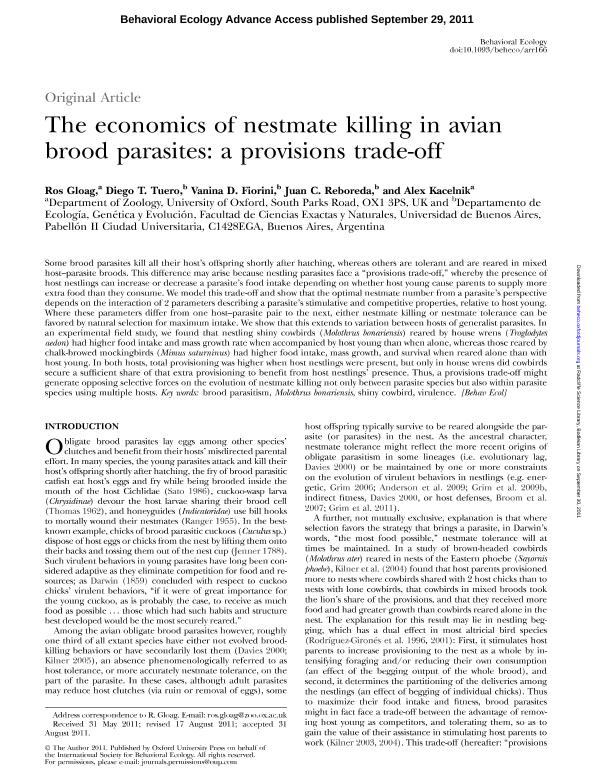Mostrar el registro sencillo del ítem
dc.contributor.author
Gloag, Ros

dc.contributor.author
Tuero, Diego Tomas

dc.contributor.author
Fiorini, Vanina Dafne

dc.contributor.author
Reboreda, Juan Carlos

dc.contributor.author
Kacelnik, Alex

dc.date.available
2019-01-17T20:54:19Z
dc.date.issued
2012-01
dc.identifier.citation
Gloag, Ros; Tuero, Diego Tomas; Fiorini, Vanina Dafne; Reboreda, Juan Carlos; Kacelnik, Alex; The economics of nestmate killing in avian brood parasites: A provisions trade-off; Oxford Univ Press Inc; Behavioral Ecology; 23; 1; 1-2012; 132-140
dc.identifier.issn
1045-2249
dc.identifier.uri
http://hdl.handle.net/11336/68228
dc.description.abstract
Some brood parasites kill all their host's offspring shortly after hatching, whereas others are tolerant and are reared in mixed host-parasite broods. This difference may arise because nestling parasites face a "provisions trade-off," whereby the presence of host nestlings can increase or decrease a parasite's food intake depending on whether host young cause parents to supply more extra food than they consume. We model this trade-off and show that the optimal nestmate number from a parasite's perspective depends on the interaction of 2 parameters describing a parasite's stimulative and competitive properties, relative to host young. Where these parameters differ from one host-parasite pair to the next, either nestmate killing or nestmate tolerance can be favored by natural selection for maximum intake. We show that this extends to variation between hosts of generalist parasites. In an experimental field study, we found that nestling shiny cowbirds (Molothrus bonariensis) reared by house wrens (Troglodytes aedon) had higher food intake and mass growth rate when accompanied by host young than when alone, whereas those reared by chalk-browed mockingbirds (Mimus saturninus) had higher food intake, mass growth, and survival when reared alone than with host young. In both hosts, total provisioning was higher when host nestlings were present, but only in house wrens did cowbirds secure a sufficient share of that extra provisioning to benefit from host nestlings' presence. Thus, a provisions trade-off might generate opposing selective forces on the evolution of nestmate killing not only between parasite species but also within parasite species using multiple hosts.
dc.format
application/pdf
dc.language.iso
eng
dc.publisher
Oxford Univ Press Inc

dc.rights
info:eu-repo/semantics/openAccess
dc.rights.uri
https://creativecommons.org/licenses/by-nc-sa/2.5/ar/
dc.subject
BROOD PARASITISM
dc.subject
MOLOTHRUS BONARIENSIS
dc.subject
SHINY COWBIRD
dc.subject
VIRULENCE
dc.subject.classification
Otras Ciencias Biológicas

dc.subject.classification
Ciencias Biológicas

dc.subject.classification
CIENCIAS NATURALES Y EXACTAS

dc.title
The economics of nestmate killing in avian brood parasites: A provisions trade-off
dc.type
info:eu-repo/semantics/article
dc.type
info:ar-repo/semantics/artículo
dc.type
info:eu-repo/semantics/publishedVersion
dc.date.updated
2019-01-17T13:56:23Z
dc.journal.volume
23
dc.journal.number
1
dc.journal.pagination
132-140
dc.journal.pais
Reino Unido

dc.journal.ciudad
Oxford
dc.description.fil
Fil: Gloag, Ros. University of Oxford; Reino Unido
dc.description.fil
Fil: Tuero, Diego Tomas. Universidad de Buenos Aires. Facultad de Ciencias Exactas y Naturales. Departamento de Ecología, Genética y Evolución; Argentina. Consejo Nacional de Investigaciones Científicas y Técnicas. Oficina de Coordinación Administrativa Ciudad Universitaria. Instituto de Ecología, Genética y Evolución de Buenos Aires. Universidad de Buenos Aires. Facultad de Ciencias Exactas y Naturales. Instituto de Ecología, Genética y Evolución de Buenos Aires; Argentina
dc.description.fil
Fil: Fiorini, Vanina Dafne. Universidad de Buenos Aires. Facultad de Ciencias Exactas y Naturales. Departamento de Ecología, Genética y Evolución; Argentina. Consejo Nacional de Investigaciones Científicas y Técnicas. Oficina de Coordinación Administrativa Ciudad Universitaria. Instituto de Ecología, Genética y Evolución de Buenos Aires. Universidad de Buenos Aires. Facultad de Ciencias Exactas y Naturales. Instituto de Ecología, Genética y Evolución de Buenos Aires; Argentina
dc.description.fil
Fil: Reboreda, Juan Carlos. Universidad de Buenos Aires. Facultad de Ciencias Exactas y Naturales. Departamento de Ecología, Genética y Evolución; Argentina. Consejo Nacional de Investigaciones Científicas y Técnicas. Oficina de Coordinación Administrativa Ciudad Universitaria. Instituto de Ecología, Genética y Evolución de Buenos Aires. Universidad de Buenos Aires. Facultad de Ciencias Exactas y Naturales. Instituto de Ecología, Genética y Evolución de Buenos Aires; Argentina
dc.description.fil
Fil: Kacelnik, Alex. University of Oxford; Reino Unido
dc.journal.title
Behavioral Ecology

dc.relation.alternativeid
info:eu-repo/semantics/altIdentifier/url/https://academic.oup.com/beheco/article/23/1/132/233563
dc.relation.alternativeid
info:eu-repo/semantics/altIdentifier/doi/https://doi.org/10.1093/beheco/arr166
Archivos asociados
